Digital freight network Convoy announced Thursday it has built a proprietary real-time transportation fraud detection system using machine learning and carrier behavioral data and cargo theft solutions providers to identify potential transportation deception and crime.
According to the company’s cargo theft prevention partner, CargoNet, cargo theft has increased over 57% year over year (y/y) in Q2 2023, trailer theft has increased 17% y/y in Q2 along with an increase in double brokering schemes. There was over $223 million in cargo loss in 2022 alone.
In response, Convoy compliance executives have been working closely since January with development teams and its shipper customers to build a multistep system to combat cargo crime.
In an interview with FreightWaves, Convoy’s head of performance, compliance and trust, Eric Libby, explained that the company has adopted new technology throughout its freight tendering and execution process to catch the ways carrier and noncarrier scammers commit fraud.
A risk assessment is performed during onboarding, flagging teams to any past fraudulent activity or connection to fraud. Carriers that come back as high-risk are blocked from bidding on loads until legitimacy can be proven.
If a load is assigned to an approved carrier and any anomalies occur throughout transit, the operations teams are notified of that activity. Cargo sensors and GPS tracking can detect anomalies such as unloading at unexpected locations and driving out of the intended lanes.
In regard to double brokering, currently becoming an increasingly attractive scam, Convoy’s new system uses app behavior data and available fleet data to determine whether it is feasible for the said truck to deliver the load and will alert operations of risk.
Why go the proprietary route?
As fraud continues to gain traction, compliance providers have showcased their efforts to help mitigate these problems for transportation providers.
However, Convoy found it important to take on the responsibility for its carriers and shipper customers alike, as scams become more sophisticated.
“We elected to build this ourselves. There are plenty of options out there on the market, but we see this as a threat that is changing every day,” said Ryan Gist, associate general counsel at Convoy. “We need to be in control of all of the levers so if we see a new behavior, we are able to go in and quickly change our model and account for that behavior in seconds. We are not relying on someone else to do that for us.”
Libby also spoke on ways that current providers weigh certain data points so heavily that it could potentially exclude reliable carrier partners.
“We try to take a carrier-centric approach to observing carrier behavior and data,” he said. “There are a lot of false positives that come from providers. For example, saying you don’t have inspections means you’re bad. Inspections aren’t always in the carrier’s control. We have also heard some commentary about the Department of Transportation not accommodating carriers anymore. They used to be more open to you showing up to a weigh station and getting inspections, but a carrier shouldn’t have to do that either to prove their behavior.”
Gist added that those false positives are unsatisfactory for shippers.
“This creates a problem for shippers because they are lulled into a false sense of security with a heuristic characteristic and they think that they are safe. Instead, you have banned 1,000 carriers from your network and have only caught one bad actor and missed out on 10 other bad actors, creating a bigger problem,” he explained.
The data is working
While Convoy does still utilize data, it has found that its new fraud detection software has become increasingly effective at proactively flagging bad actors before the company even onboards them.
“In Q1 there were two carriers, which we will refer to as Carrier A and Carrier B, that were reported to the industry for cargo theft,” said Libby. “We fed their data into our model and over the next few months, we found 24 carriers that were closely associated with both A and B. One of those new 24 carriers was Carrier C.”
Libby went on to explain that in August, a new carrier, Carrier D, was flagged for being closely associated with Carrier C and was blocked from onboarding onto the app. Convoy went on to give Carrier D the opportunity to prove its legitimacy. During that process, Carrier D sent a photo of its truck that was clearly photoshopped onto Carrier C’s truck.
“They digitally altered the name and it confirmed to us our system was working correctly to catch these bad actors in real time. We reported this carrier to law enforcement to prevent this fraud from happening again and found out that in the past two weeks, Carrier D had been reported for stealing at least 10 shipments in Southern California into the millions of dollars of lost cargo.”
While the system is working to eradicate these carriers from the industry, both leaders acknowledged that criminals will continue to learn new tactics.
“We have created a substantial 12-to-18-month road map with additional modeling techniques to prevent these situations from happening,” said Libby. “We look forward to getting to artificial intelligence and seeing how that can help call out different fraudulent changes as the technology is seeing it happen.”
Read more
Convoy releases Just-In-Time service
Convoy hires bank to advise on strategic interest
Knight-Swift lays off employees after expressing market weakness
The post Convoy releases proprietary fraud detection software appeared first on FreightWaves.














